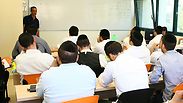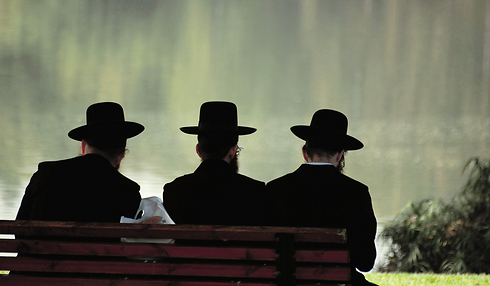
Sharp rise recorded in number of Haredi students
The number of new ultra-Orthodox students in Israel’s academic institutions nearly tripled itself from 2008 to 2014, according to Taub Center’s State of the Nation Report 2016, yet the percentage of young Haredi men and women with an academic degree remains very low.
A growing number of ultra-Orthodox Jews are studying in academic institutions, according to the Taub Center’s State of the Nation Report 2016, which was published Wednesday morning and presents the current state of education in Israel compared to other countries and to previous years.
One of the report’s chapters deals with the integration of Haredim into academic studies, pointing to a rise in the number of Haredim studying for an academic degree in recent years. From 2008 to 2014, the number of new Haredi students nearly tripled itself: From 1,122 to 3,227. The number of Haredi university graduates in 2014 was about 1,600 women and 450 men, compared to only 650 women and 200 men in 2012.

Despite the impressive increase, the number of young Haredi men and women who hold an academic degree remains very low: In 2014, only about 2.5 percent of Haredi men and about 8 percent of Haredi women in the 25-35 age group had an academic degree, compared to 28 percent of secular men and 43 percent of secular women.
A breakdown according to Haredi streams, which was conducted in this study for the first time, reveals that the highest rate of students is among Chabad Hasidim (29 percent of the women and 15 percent of the men). Among the women in the other three main streams (Lithuanian, Hasidic and Sephardic), the highest rate of students is among the Lithuanians (15 percent), and they also have the lowest dropout rate (29 percent).
About 58 percent of male Haredi students drop out of academic studies (preparatory courses and degrees) compared to 30 percent of non-Haredi Jews. Most of them are admitted to academic institutions without a matriculation certificate and without taking the psychometric test. In 2014, 53 percent of all Haredi students were admitted without a matriculation certificate and psychometric test, compared to 26 percent in 2000.
Eitan Regev, a senior researcher at the Taub center who authored this chapter, explains that the fact that most Haredi students did not study core subjects in high school seriously affects their ability to complete an academic degree. He notes that the problem is mostly evident in English studies. A comparison of the psychometric grades of secular students and Haredi students reveals a major gap of 20 points in the English part of the test, compared to a gap of six or seven points in the math grade and no gap in the verbal part of the exam.










